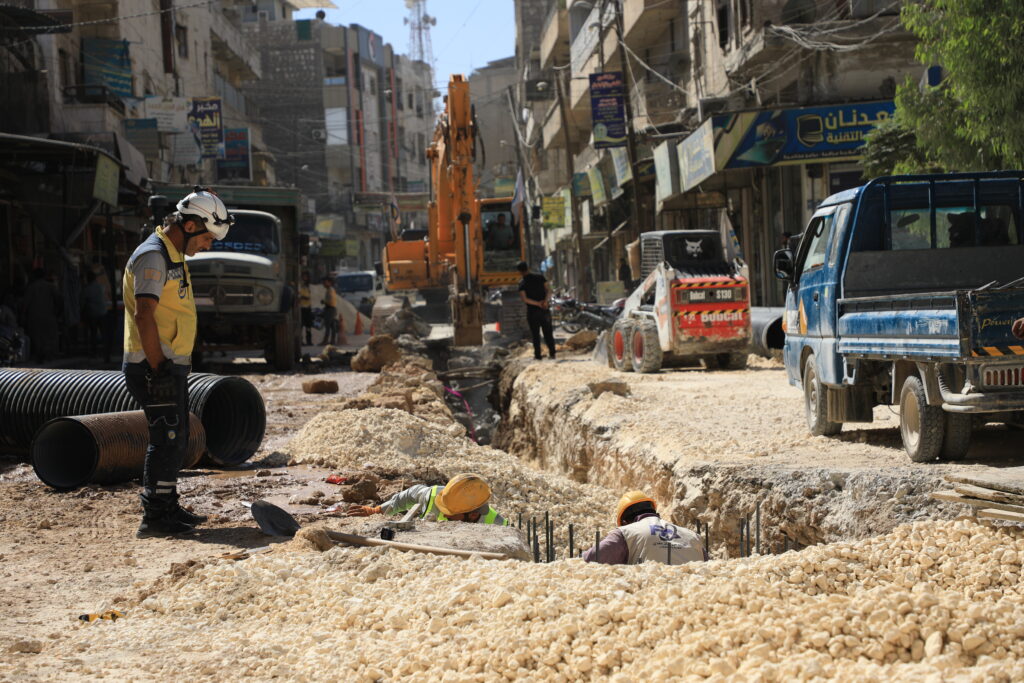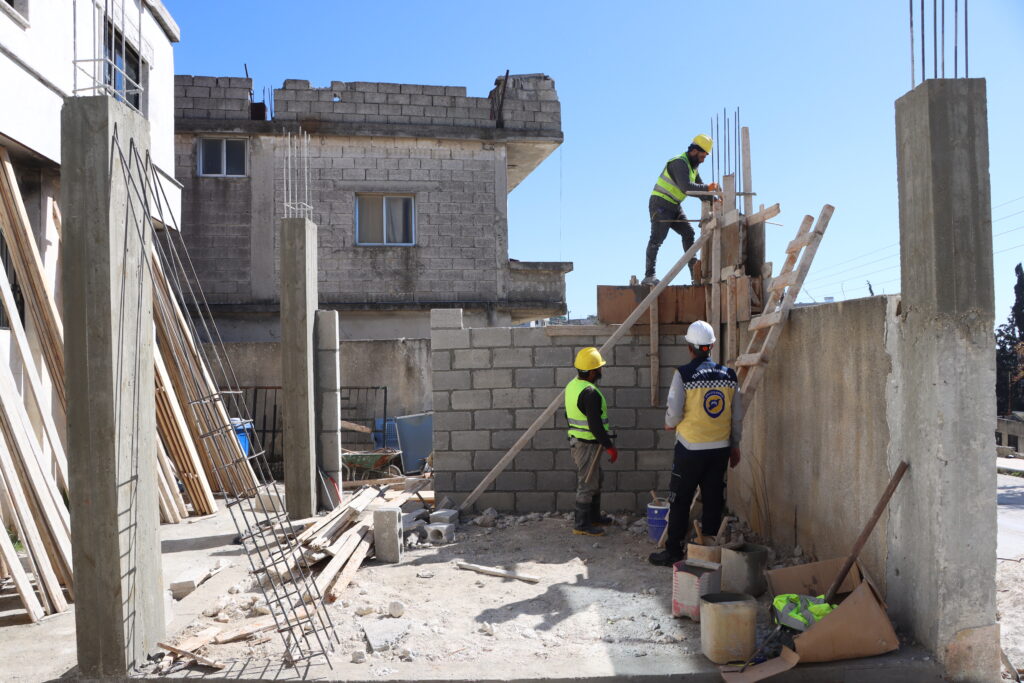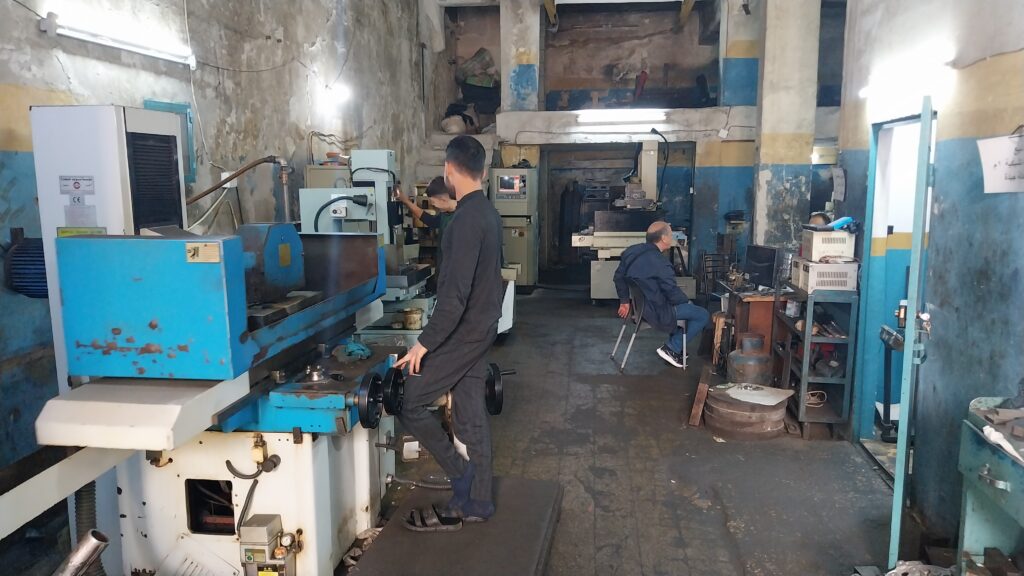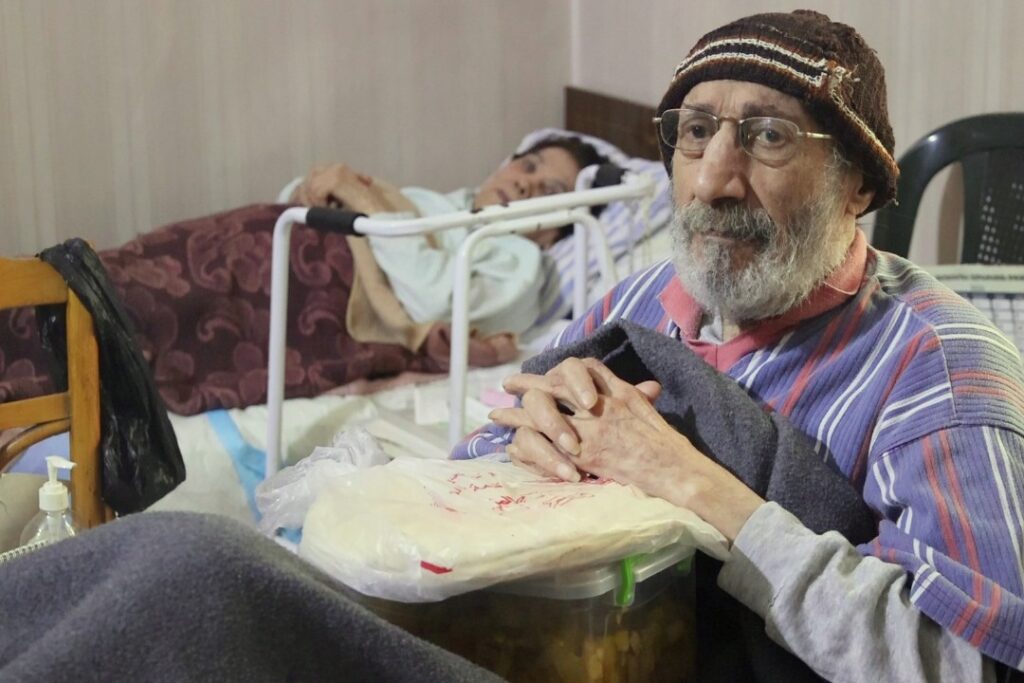In the aftermath of the devastating February 2023 earthquake that struck Turkey and Syria, the northwest region of Syria faced massive destruction after having already suffered from the impacts of years of conflict. Amidst this devastation, the Dutch relief initiative Giro555 provided crucial funding that empowered Cordaid’s partner organisations, the White Helmets and Pro Terra Sancta, to restore hope and dignity to affected communities through healthcare, infrastructure, and humanitarian support.

Revitalising Healthcare in Northwest Syria
The earthquake left medical facilities across northwest Syria severely damaged, crippling the region’s capacity to deliver essential health care. The White Helmets, supported by Giro555 and Cordaid, mobilised engineers and construction workers to restore 21 critical medical facilities, including hospitals, health centres, and blood banks.
Among these facilities was the Al Amal Hospital in Salqin, a lifeline for hundreds of thousands of displaced persons and residents. Dr Ibrahim Al-Khatib, a physician at the hospital, recounts the transformative impact of the renovations: ‘Two years ago, the hospital’s extensive damage hindered our ability to provide care. Today, we can serve more patients and offer new services with the infrastructure restored. This isn’t just about rebuilding walls—it’s about restoring hope to the region.’
The Al Hidaya Hospital in Qah, near the Turkish border, serves a population of over a million and receives approximately 12,000 patients monthly. Damaged foundations and other structural vulnerabilities necessitated extensive renovations. Engineer Mustafa Al Yousef described the meticulous work: ‘We reinforced the hospital with concrete to ensure safety and have begun restoring the upper floors. This work improves healthcare access for thousands of patients, including those requiring specialised treatments like dialysis.’

For patients like Ahmad Nakous, a dialysis-dependent elder displaced by conflict, the hospital’s restoration has been life-changing. ‘The care here is excellent,’ he shares. ‘The White Helmets even assist with transport, easing the burden of my treatment. To everyone who made this possible: your support alleviates our suffering.’
Rebuilding Critical Infrastructure
The earthquake wreaked havoc on the region’s already fragile infrastructure, destroying roads, sanitation systems, and essential utilities. The White Helmets, using Giro555 funds, spearheaded numerous reconstruction projects aimed at improving safety, mobility, and public health.
One such initiative was the restoration of the road connecting Nimra and Ghafar. Once riddled with potholes and debris, the six-kilometre stretch had become a perilous barrier to aid delivery and medical access. Ali Al Jooma, lead engineer for the project, highlights its importance: ‘This road is a lifeline for the region. Ambulances, humanitarian assistance, and residents all depend on it. Despite challenges like nearby conflict, which forced our teams more than once to seek shelter, and material shortages, we’ve created a safer, more efficient route that benefits everyone.’
The road’s reconstruction has reduced ambulance travel times and expanded access to health centres in nearby villages like Al-Bala’a and Kanisa Bani Ezz. Residents like gas station owner Jooma Suliman have seen economic and social revitalisation: ‘This road has breathed new life into our community,’ he says.
In the village of Abu Talha, the White Helmets addressed another critical need: repairing the sewage and water systems. ‘The outdated sewage system posed serious health risks,’ explained engineer Mohammad Al-Da’eef. ‘With four kilometres of new pipelines, we’ve eliminated contamination risks and improved sanitation for 5,000 residents.’ Similar projects in Al-Bab included replacing five kilometres of sewage lines and installing a new three-kilometre drinking water system. These improvements prevent disease outbreaks and provide displaced people and residents with safer living conditions.
Supporting Livelihoods…
Beyond healthcare and infrastructure, Giro555 funding has supported Pro Terra Sancta’s efforts to help individuals and families rebuild their lives. This includes initiatives to repair homes, distribute food, and support local businesses.

In Aleppo, Kamal Kelzi’s story illustrates the resilience and determination of Syrian entrepreneurs. Once a thriving producer of machine parts with international clients, Kamal’s workshop was destroyed during the war and further damaged by the earthquake. Struggling to rebuild, he participated in a business startup program funded by Giro555 in May 2024. The programme enabled him to purchase a second machine, doubling his production capacity. ‘There were times I thought about leaving Syria,’ Kamal admitted. ‘But now, I can contribute to my country’s recovery. Many machines here are broken, and I can repair them. That’s my way of helping.’
…and Restoring Dignity
Food insecurity remains a dire challenge in Syria, where bread is a dietary staple but often inaccessible due to shortages and high prices. Pro Terra Sancta partnered with the Franciscan brothers to establish a bakery in Aleppo to address this. Using Giro555 funds, they increased production from 200 kilogrammes of dough per day in early 2024 to 600 kilogrammes by December. The bread is distributed to orphanages, elderly care centres, and shelters for displaced people, offering sustenance and a message of solidarity. ‘When we hand out bread,’ said Father Talal Jabbour, ‘it’s like a service of hope. We’re telling people, “You’re not alone.”‘

One of the most profound impacts of Giro555’s support has been enabling families to return to their homes. In Aleppo’s Karm-Dodo district, Pro Terra Sancta repaired 100 damaged homes, including that of Um Bakri and her family. Displaced after the earthquake left their home uninhabitable, they lived with 14 people in two cramped rooms at a relative’s house. ‘When we returned, it felt like a miracle,’ Um Bakri said. ‘Our home is safer and better than before. Now, my children can return to school, and we can rebuild our lives.’
A Future Built on Solidarity
The stories from northwest Syria are a testament to the resilience of its people and the power of global solidarity. Through the support of Giro555 and its partner organisations, communities devastated by war and natural disasters regain access to essential services, rebuild their infrastructure, and reclaim their dignity. AS Dr Wael Murad of Al Hidaya Hospital said, ‘This work doesn’t just rebuild structures—it restores hope, health, and dignity.’
Recent developments in Syria have also provided glimmers of hope for its people. Following the fall of the Assad regime, significant changes have swept across the country.
Khaled Khatib of the White Helmets reflected on this pivotal shift: ‘Since the regime’s fall, the bombardments have thankfully ceased. However, the aftermath of the war and the earthquake remains immense. The country is largely destroyed, government services are non-functional, and basic needs are scarcely met. Yet, with the support of organisations like Cordaid and the Netherlands, we’ve addressed some of the most pressing needs, such as health care. Don’t forget, until just days before the regime fell, hospitals like Aleppo’s university hospital were still being bombed. There is joy and hope now, but the needs remain overwhelmingly great.’
While the challenges remain immense, international support initiatives, like Giro555, offer a glimpse of a brighter future for Syria.
